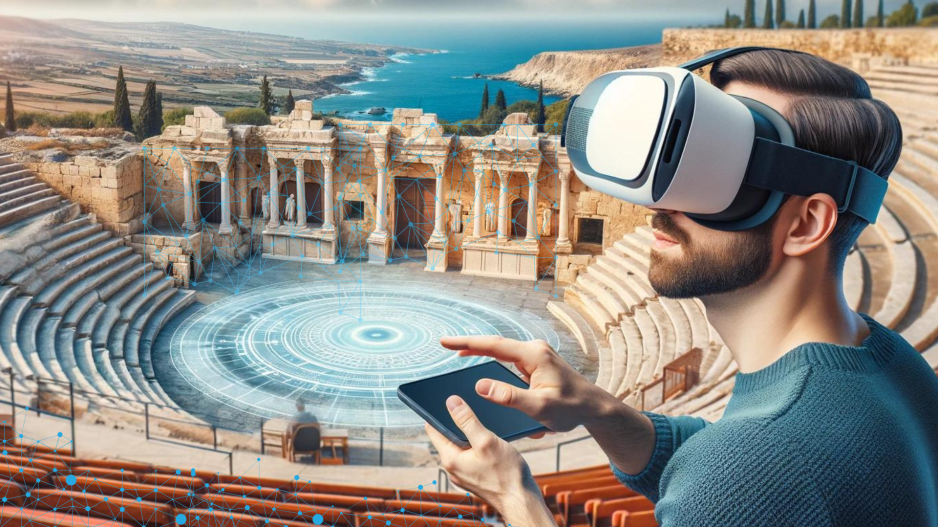The Role of Technology in Boosting Cyprus' Tourism Industry
The Rise Of Personalisation & Virtual Reality
Tourism is a vital component of the Cypriot economy, representing approximately 20% of the nation's GDP. As global travel evolves, Cyprus is leveraging technology to enhance the tourist experience, streamline operations, and market its attractions more effectively.
Technology plays a crucial role in addressing the diverse needs of tourists, from the initial trip planning stages to the on-the-ground experiences and post-visit engagement. The integration of digital tools and smart solutions allows Cyprus to offer personalised services, ensure efficient operations, and promote sustainable tourism practices. By leveraging technologies such as virtual reality (VR), augmented reality (AR), mobile applications, and smart infrastructure, Cyprus is setting a new standard in the tourism industry.
By keeping up with technological advancements and taking into consideration upgraded audience needs and wants, Cyprus not only preserves its rich cultural heritage and natural beauty but also ensures a modern, convenient, and enjoyable experience for all who visit.
Tourism has always been a touchpoint for Cyprus as a whole, but especially to the island’s economy, significantly contributing to its GDP and employment. In 2023, tourism arrivals in Cyprus faced a huge surge of 20.1% compared to the previous year, representing the third highest performing year in the country’s tourism history.
In 2019, the tourism sector accounted for approximately 21% of Cyprus’ GDP, highlighting its vital role in the nation’s economic health. According to the Cyprus Statistical Service, Cyprus welcomed around 3.98 million tourists in 2019, marking a record year of arrivals. Despite a couple of tumultuous years following the COVID-19 pandemic, Cyprus’ tourism has managed to recover, with visitors from the United Kingdom, Russia and Greece occupying the largest numbers of tourists.
The peak tourist season runs from April to October, with July and August being the busiest months every year. During this period, the island’s population can swell significantly, placing additional demands on infrastructure and services. To manage this surge effectively, Cyprus has turned to technology, implementing smart solutions to enhance visitor experiences and operational efficiency.
Moreover, the rise of niche tourism markets, such as cultural tourism, ecotourism and medical tourism, has further diversified Cyprus’ tourism portfolio. The government and private sector have made concerted efforts to develop these areas, investing in specialised facilities and marketing campaigns to attract a broader range of visitors at diverse locations of the island. For example, the development of wellness and spa resorts caters to the growing demand for health and wellness tourism, while eco-friendly initiatives and agro-tourism appeal to environmentally-conscious travellers.
One of the most exciting technological developments in Cyprus' tourism sector is the use of VR and AR. These technologies are particularly impactful in historical and archaeological contexts. For example, visitors to ancient sites like the Tombs of the Kings or the ruins of Salamis can use VR headsets to see these locations as they once were, offering a unique and immersive experience that enriches their understanding and appreciation of Cypriot history.
Additionally, before even setting foot on the island, visitors can explore historical sites, such as Kourion, through online virtual tours and get a clear representation of what to expect, in order to make informed decisions on their vacation planning and also get an indicative glimpse into Cyprus’ offerings and history.
Mobile travel apps have become indispensable for modern tourists. In Cyprus, customised apps provide real-time information on local attractions, weather, transportation options, and even language translation services. These apps enhance visitor independence and experience by providing easy access to essential travel services and insightful local knowledge.
For example, EnterCy is a virtual and immersive reality platform that allows users to experience Cyprus through spatio-temporal VR exploration and interactive digital content of over 100 of the most important tourist sites in Cyprus before their visit, while also giving them the option to share their experiences through immersive reality technologies after their visit. Through features such as augmentation of cultural heritage sites, virtual navigation, personalised journey creation and recommendations, the app allows users to streamline their experience to their own preferences and experience Cyprus in an easy, interactive and enjoyable way.
AI is being employed to personalise the travel experience in Cyprus. By analysing data on travel preferences, spending habits, and previous destinations, AI can suggest customised itineraries that match the tourist’s personal interests. This not only improves the visitor's experience but also helps local businesses target potential customers more effectively.
Cyprus is slowly making progress in the field, but there is still a long way to go. Only 3% of Cypriot companies use AI technologies, while one in three use the internet, which is higher than the European average. However, AI-driven chatbots and virtual assistants on tourism websites and mobile apps, have also proven to be efficient in the vacation planning journey, as they provide instant responses to visitor inquiries and assist with booking recommendations, in making the personalised process simpler, easier and faster.
Cyprus’ tourism industry is also benefiting from advanced digital marketing techniques. Through social media platforms, interactive websites, and targeted advertising, Cyprus promotes its tourism offerings to a global audience. Effective use of online marketing has been crucial in attracting tourists from new and emerging markets, with targeted and personalised ads reaching them at the right place, at the right time.
The Cyprus Tourism Organisation and various private sector stakeholders have utilised digital platforms to create engaging and visually-appealing campaigns that showcase the island’s diverse attractions on social media and beyond, especially Instagram and TikTok which are great platforms for reaching a younger audience and for promoting luxurious, attractive and unique locations that will inspire tourists to visit.
The new norm in tourism features digitalisation at its core. With Japan and China setting the pace in terms of implementing fully digitised features and procedures in recent years, Cyprus is slowly but surely gaining momentum in also introducing these rapid changes, especially in the sector of hospitality.
Following the need for less face-to-face interaction after the latest pandemic, robotic technology and service automation will play a crucial role in the user experience. Self-check-in, online orders, contactless transactions and cleaning and disinfection services, etc, are already sounding as attractive options, which may lead to the elimination of numerous job positions, while maintaining a high-level of quality of services in the long run.
Despite these advancements, the integration of technology in tourism also presents challenges. Issues such as data privacy, high initial technology investment costs, and the need for ongoing training and maintenance must be addressed. The elimination of important jobs, especially in the hospitality sector, such as concierge and front desk, may also be another result of the huge advancement and implementation of technology in all industry matters.
Additionally, the rise of digitisation may lead to a digital divide, as not all stakeholders within the tourism sector can accommodate the adoption and expertise of such advanced technologies. Small businesses, such as family-run hotels and local tour operators, may struggle with the costs and complexities of implementing new digital tools, potentially limiting their competitiveness in comparison to big, household names.
Cybersecurity is another critical concern, as more tourism operations move online. The risk of cyber attacks necessitates robust security measures to protect sensitive customer data and ensure the integrity of digital transactions. Moreover, the reliance on technology makes the sector vulnerable to disruptions caused by technical failures and cyber incidents, which can adversely affect the visitor experience.
Despite these challenges, the future prospects of Cyprus’ tourism industry remains promising. As technology continues to evolve, so too will its applications in enhancing travel experiences and boosting tourism revenue in Cyprus, as the strategic adoption of technology will continue to position Cyprus as a leading modern destination for worldwide tourists.
The integration of technology into Cyprus’ tourism industry is transforming traditional travel experiences into something far more dynamic and personalised. This not only bolsters Cyprus' position as a premier tourist destination but also contributes significantly to the local economy. As technological advancements continue, the potential for new and innovative applications in tourism appears boundless and Cyprus must remain at the forefront of implementing any digitised solutions that ensure a modern, convenient and enjoyable experience for anyone who visits the island.






